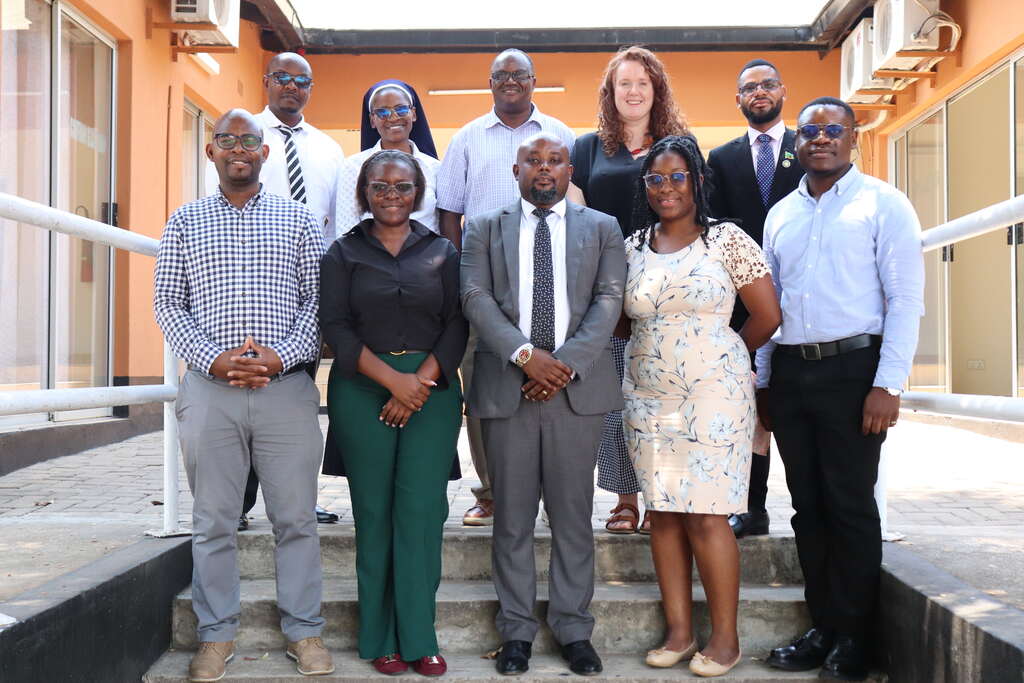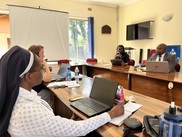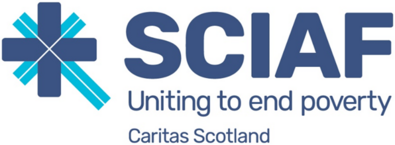
MONDAY, OCTOBER 27, 2025, LUSAKA - The Jesuit Centre for Theological Reflection (JCTR) recently welcomed Aisling Gallacher, Zambia and Malawi Programme Officer at the Scottish Catholic International Aid Fund (SCIAF), for a monitoring visit to the Centre’s Lusaka office.
The visit aims to engage with JCTR staff on the progress of the SCIAF-supported Agroecology Project, which is being implemented under JCTR’s Faith & Justice (F&J) programme. The project seeks to promote agroecology and food justice by strengthening the capacities of small-scale farmers in Rufunsa, Chongwe, Pemba, and Mongu districts to advocate for policies and a legislative environment that support sustainable and climate-resilient food production practices.
During her visit on Monday, October 27, Aisling met with JCTR’s Executive Director, Fr. Daniel Mwamba Mutale, S.J., PhD, and members of staff across programmes and units. The discussions reflected on JCTR's hollistic achievements, challenges, and ongoing priorities, including safeguarding, financial accountability, and community engagement.
“Agroecology presents a holistic pathway for Zambia’s rural communities to achieve both food security and environmental sustainability,” emphasised the discussions during the visit. “Through partnerships like the one between JCTR and SCIAF, communities are being equipped not only to adapt to climate change but to transform local agricultural systems in a just and sustainable way”
- Micomyiza Dieudonn'e, Faith and Justice Programme Officer and Agroecology Project Lead.
The Agroecology Project has emerged as a vital initiative in addressing the vulnerability of rural households dependent on rain-fed agriculture amid the growing effects of climate change. By promoting agroecological practices such as crop rotation, intercropping, organic soil enrichment, and reduced tillage, the project encourages sustainable food systems that enhance productivity while conserving natural resources. Findings from JCTR’s field assessments have shown that farmers practising elements of agroecology report improved yields, better soil health, and enhanced resilience to drought and pest challenges.
However, limited policy support remains a key challenge. Current agricultural policies, including the National Agriculture Policy (2012–2030) and the 8th National Development Plan (8NDP), focus on conventional and conservation farming, with little explicit recognition of agroecology. Through its advocacy and policy engagement, JCTR continues to call for the inclusion of agroecology in Zambia’s agricultural policy framework, increased budget allocations toward sustainable agriculture, and stronger institutional support for small-scale farmers.
The visit reaffirmed both institutions’ shared commitment to promoting equity, accountability, and environmental stewardship. Through continued collaboration, JCTR and SCIAF remain dedicated to advancing practical solutions that respond to the realities of Zambia’s most vulnerable populations — building a future where justice, sustainability, and human dignity prevail.
_______________
Be on the lookout for the agroecology report and policy brief soon to be uploaded here!




